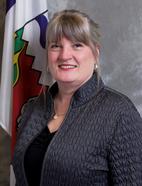Thank you, Mr. Speaker. Just a little bit of trivia, when I was sworn into this Legislature the first time, there’s a video footage of my family out in the Member’s lounge and my husband was holding my daughter in his arms and Jillian was six years old. Now almost all of my grandchildren are now older than six years old, but today I want to talk about the rights of grandparents.
I’ve often got on the plane to fly here to Yellowknife to do my work and thought that I’m blessed because I could not be doing that work if I did not know that my five grandchildren were in good hands, in good care and that they were safe and being well cared for. Not every grandparent has that blessing and has that privilege to know that. What’s
even
sadder
is
that
sometimes
grand
parents don’t have the ability, and they are
blocked from intervening when it comes to the well- being of the grandchildren.
So, today I want to talk about the rights of grandparents in the Northwest Territories. When it comes to rules for visitation and custody, grandparents’ rights is an evolving field across our country. It’s affected by new case law as well as
changing understandings of what family means and what role different individuals can or should take to ensure a child’s welfare. But there’s one thing we know for certain, and that’s that our NWT visitation and caregiving legislation doesn’t even address grandparents directly. This isn’t the case in Alberta, British Columbia, Manitoba, New Brunswick, Nova Scotia, Quebec or the Yukon. These jurisdictions expressly recognize grandparents and clearly give them opportunities to pursue their cases. Nova Scotia introduced a package of grandparents’ rights legislation just last fall.
We know from public hearings on the Child and Family Services Act that NWT grandparents often play a vital role in their children’s lives. They can provide care, emotional and financial support, and essential links to traditional cultures in home communities.
The Standing Committee on Social Programs highlighted these in our recommendations on the Child and Family Services Act, and I quote, “According to one weary grandmother who has fostered several grandchildren, ‘I’m tired and I’m angry and this government is actually going backwards. When are things going to change for the
better?’” That’s about grandparents and foster
care, but today I want to extend this conversation to also speak to grandparents seeking something as simple as visitation and custody.
These are complicated questions and in every Canadian jurisdiction, legislation requires us to always prioritize the best interest of the child in any decision or ruling.
I’d like to seek unanimous consent to conclude my statement.
---Unanimous consent granted
